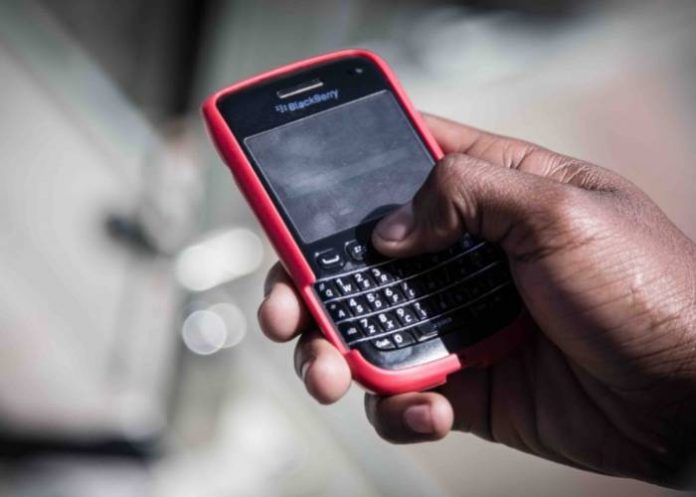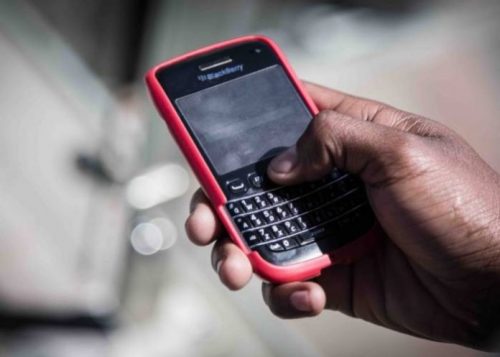
The Chairman of the Independent National Electoral Commission (INEC), Mahmood Yakubu, on Thursday, said the commission is considering banning the use of mobile phones at polling units.
Mr Yakubu made this known on Friday at an Election Dialogue Series organised by a civil society organisation, YIAGA’s WatchingTheVote, at Sheraton Hotels in Abuja.
He explained that mobile phones would be collected from voters when they collect their ballot papers at the polling stations, to curb vote buying in the country.
”The commission would try and ban the use of some devices that aid vote buying on election day such as mobile phones,” Yakubu said.
The INEC boss explained that those who carry mobile phones along to polling units normally use them to take pictures of the ballot papers as evidence to the vote buyers.
”It is all widespread that for those who have smart phones, they go into the voting cubicles with there smart phones, thumbprint the ballot paper, take a picture with the ballot paper, fold it and drop it into the box, and later show it to the person who asked them to vote to see evidence that they have voted for there candidate.
”But I also think that the political parties may be for a shocker because there are also smart guys in Nigeria that would snap and send to others through whatsapp and one ballot paper may be claimed by hundreds of people,” he added.
”We are looking at that possibility to tell citizens that have smart phones not to come to polling units on election day with the smart phones.”
Also at the event, Mr Yakubu spoke on the importance of increasing sensitisation and education to enlighten voters on the implication of vote selling and buying.
He spoke on the role of INEC in the Electoral Act that requires it to prosecute electoral offenders, which include vote buying.
”But what about the other agencies that worked with the electoral commission like the security agencies? It is first and foremost about the enforcement. There are laws in the book against vote buying and in any country that the laws are not enforced, then that nation is doomed. It is about enforcement.
”Unfortunately in the Electoral Act, INEC is required to prosecute electoral offenders which include vote buyers; but look at the situation. To successfully prosecute, you have to make arrests. We have no police to make arrests. To successfully prosecute after arrest you have to make investigations; we seem to have no capacity to investigate. How do we then successfully prosecute?
”What we have been doing is to work with the security agencies to see if they can make the arrests, investigate and when the case file is ready, we can work together and prosecute.
”We have done such with some success in one of the state constituency elections we conducted in 2016 in Kano. In a constituency, we successfully prosecuted over 40 electoral offenders, working with the police. It was the highest prosecution held in the history of the commission. Who did we prosecute? The hoodlums in the polling units”.
Yakubu however explained the commission was looking forward to prosecuting offenders who sponsor elections, adding that the commission has over a hundred cases of electoral violations in previous elections.
Similarly, he spoke about the violations that occur before the elections whereby cash electronic transactions were made to buy votes, adding that the commission was looking forward to working with institutions to address the menace.
”We are looking forward to the day when we prosecute their sponsors. If we don’t get them, the problem would still continue to exist. As we speak, we have over 100 case files submitted by the police for violations in previous elections and we are diligently prosecuting the offenders, including officers of the commission. So we are discussing with the security agencies to see what we can do to this respect.
”But it is not just about prosecuting electoral offenders on the day of elections, what about the violations that occur before the day of these elections, using electronic cash transfers? That is why we are challenging every national institutions to work with the commission to address this menace.
”Not too long ago we had a meeting with the EFCC, they have the capacity and the legal backing as well to track legal finances and o prosecute violators. And only last week we had a similar meeting with the ICPC as well; so we would continue to work with these agencies.
”We hope in Osun they would also help to deploy to some of the polling units so that open violation that happened in the previous elections would not happen.
”We would continue to do whatever is required of INEC to do. We have done it before in improving the electoral process. We are going to tackle the menace of vote buying and any other menace that would have a bad name to our democracy and electoral process.
”In Osun in the next eight days, we are going to deploy over 16,000 staffs. We have four staff per polling unit that are conducting elections.”



Comment here